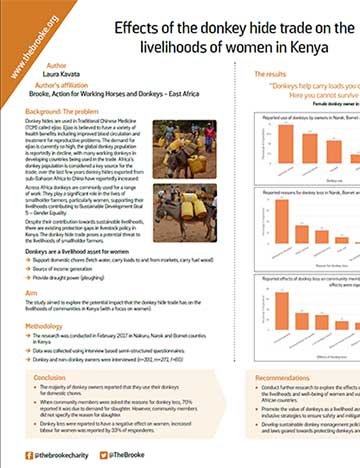Effects of the donkey hide trade in Kenya
Africa’s donkey population is considered a key source of the trade, and in recent years the numbers of donkey hides exported from Africa to China have reportedly increased.
In 2017, Brooke conducted a research study to look at the potential impact of the donkey hide trade on the livelihoods of smallholder farmers in Kenya, with women being a focus of the study. Results from this study will act as a starting point to gain a better understanding of the effects of this trade.
Background
In many African countries donkeys are used for a range of work; they support smallholder farmers, particularly women, with domestic chores such as fetching water, carrying loads to and from markets, and to provide draught power.
Donkey hides are used in a Traditional Chinese Medicine called ejiao, believed to have a variety of health benefits. Currently, the demand for ejiao is so high that the global donkey population is in decline, with many working donkeys in developing countries being taken for use in the trade.
What the research involved
A total of 331 donkey owners and non-owners were interviewed to understand their views on how the donkey hide trade affected their livelihoods.

When community members were asked the reasons for donkey loss, 70% reported it was due to the demand for slaughter; however, the reasons for slaughter were not specified.
As a result of the loss of their donkeys, 33% of respondents reported this resulted in increased labour for women in completing household chores.
What's next?
More research is needed to further understand this issue to provide the evidence base for suggested management policies and legislation.
In March 2019, this work was presented at the 7th Pan Commonwealth Veterinary Conference, where acclaimed veterinarians and academics came together from all Commonwealth and non-Commonwealth counties to share and learn.
For more information, download the poster for the presentation.
